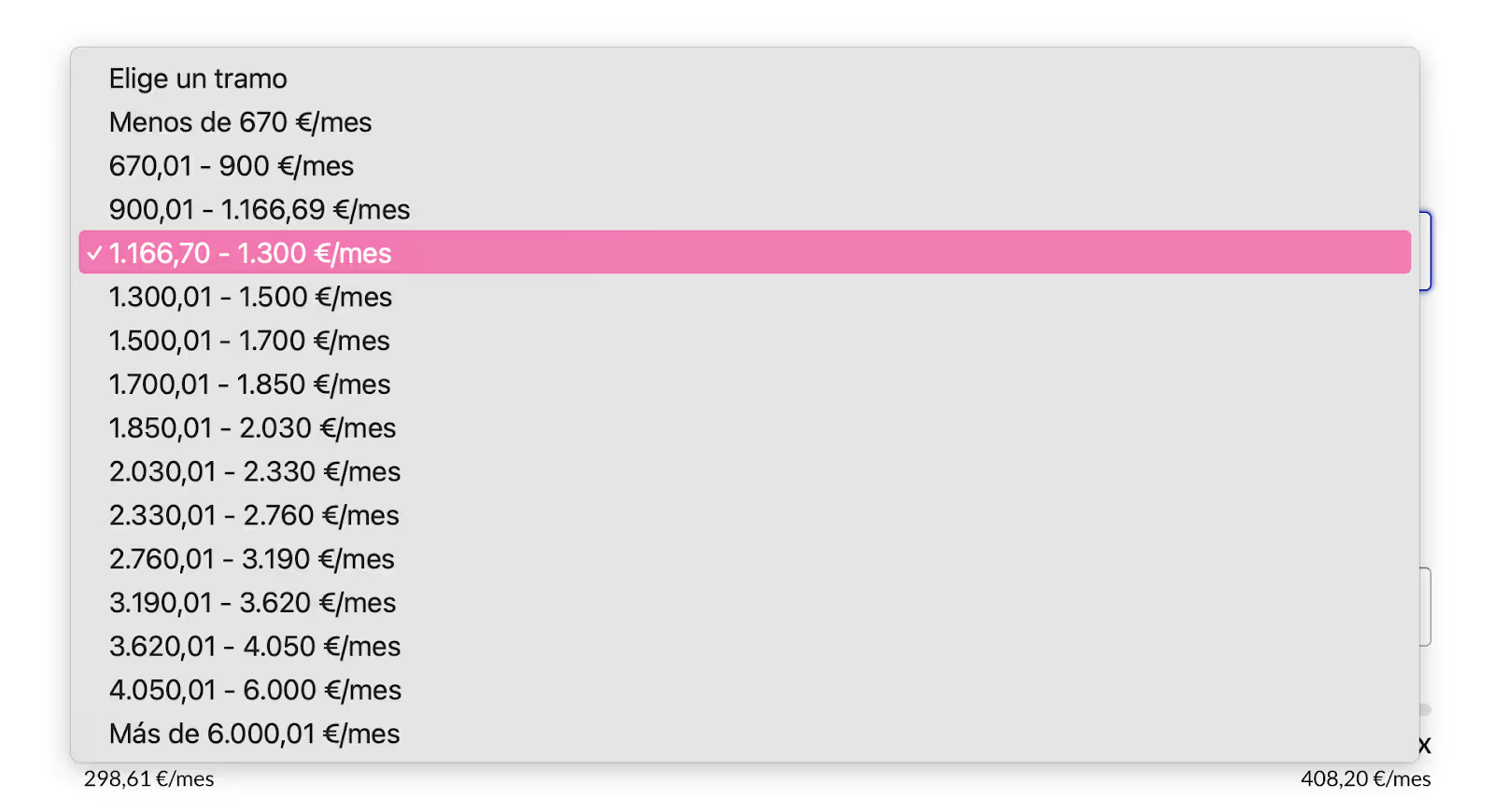If you're a freelancer in Spain: Calculating taxes can be a nightmare. Income tax, VAT, social security... you can get buried under a ton of misinformation.
Luckily, this article will save you time. It will inform you about the taxes you must pay in Spain in 2025.
You will leave informed. Let's get to work!
1) Income tax rates for freelancers
Your inevitable task as a freelancer making money in Spain:
Declare your income and pay it.
Tax rates increase gradually in Spain.
This simply means that the more you earn, the more taxes you pay.
- Rates start at 19% and go up to 47%.
Current tax rates:
- Up to €12,450: 19%
- €12,450 - €20,200: 24%
- €20,200 - €35,200: 30%
- €35,200 - €60,000: 37%
- Over €60,000: 47%
How do you calculate?
1. Have past income records?
Great! You can easily see how much tax you owe at year-end.
2. Keep an eye on your expenses.
Deduct work-related costs from your taxes to protect more of your earnings.
3. Check the table we shared.
A quick calculation will show your tax bracket and how much you need to pay.
Example income tax calculation
It would be good to give an example. Tax calculation is sometimes misunderstood.
Let's say you make €18,000 a year.
- Up to €12,450: 19% (This part will already be taxed at a flat rate).
- €12,450 - €20,200: 24% (Your earnings fall within this range)
Please avoid this mistake when calculating!
If your income falls into two brackets, the income is taxed separately. For example, the first part of 18 thousand euros is taxed at 19%, the second at 24%.
What should happen:
First tranche 0 - €12,450
- Tax: €12,450 × %19 = €2,365.50
Second tranche €12,450 - 18,000
- Your earnings in this range: €18,000 - €12,450 = €5,550
- Tax €5,550 × %24 = €1,332
Total tax?
€2,365.50 (first) + €1,332 (second) = €3,697.50
In short, some of your income will be taxed at a low rate and some at a high rate. Forget the idea that all income will be calculated at the same rate.
2) Social security contributions
The Spanish government has created a new contribution system for freelancers in 2023.
As a freelancer, you have to pay a premium to Seguridad Social based on your monthly income.
We highly recommend it.
Not only will it protect you and your family, it will help you build a secure future.
And, you can pay two ways:
- You can pay the minimum contribution floor to keep payments to a minimum.
- You can pay the maximum contribution floor for a higher pension in retirement.
Here are the current rates
- Up to €670: Min. €205,23 / Max. €225,75
- €670,01 - €900: Min. €225,75 / Max. €282,60
- €900,01 - €1.166,69: Min €266,80 / Max. €366,34

You can use the official website of Seguridad Social to find out the social contribution you have to pay.
Important note: If your income at the end of the year is less than expected, you can request a refund of your contributions. But remember that if your income is higher than expected, you will have to pay the difference.
Flat rate for new freelancers
Good news for first-time freelancers in 2023-2025. You can apply for a reduced fixed quota of €80 for the first 12 months.
But there is one more thing: If you are 33% or more disabled, a victim of gender-based violence or terrorism, you can extend it up to 24 months.
3. VAT (Value Added Tax)
VAT is a tax other than income tax that is included in every service.
In short, when you buy clothes or food, you pay VAT. And the seller transfers the VAT to the government.
In this case, you as a freelancer also need to add VAT to your outputs.
- The VAT rate for freelancers in Spain is 21%.
- A reduced 10% VAT for essentials like accommodation and transport.
- The lowest VAT is 4%. For super essentials like bread and medicine.
But if you belong to one of these, you are exempt:
- Education and training
- Health
- Social assistance services
- Finance and insurance
These services do not require VAT as they benefit the public and society.
3) Quarterly VAT return
Something you have to deal with every quarter:
- Filing Form 303 and paying the VAT bill.
Here is an example to better understand quarterly declarations
Let's say you provided services as a freelancer in March, April, and May.
- March - if you invoiced €1000 for services: 21% VAT | €210
- April - if you invoiced €500 for services: 21% VAT | €105
- May - if you invoiced €1500 for services: 21% VAT | €315
Total: 210 + 105 + 315 = €630
You have to file the declaration by July 20 and pay the total VAT of €630.
How to pay?
The Agencia Tributaria online system makes it easy.
You can simply file the VAT return using form 303.
Remember that if you are entitled to deduct VAT (e.g. for educational and financial), this amount can be deducted. In this case, calculate at 10%, not 21%.
Click here to access Form 303 on the official website.
4) Quarterly tax payments
Freelancers are asked to file a tax return every 3 months to pay income tax and social security contributions. This includes the VAT payments you just mentioned.
Quarterly tax payments are due on the 20th of April, July, October and January.
5) Deductions and allowances
"Do I always have to pay taxes, aren't there tax deductions?" you may ask.
Of course, there are deductions that allow you to keep some of your earnings.
What can you deduct from your taxes?
Common deductions include:
- Office supplies and equipment: Costs associated with running a freelance business.
- Travel and transportation: Expenses incurred while traveling for work purposes.
- Professional services: Fees for legal, accounting, and consulting services related to the business.
- Home office deduction: A portion of home expenses may be deductible if used exclusively for business.
VAT reductions
If you provide health, education, social welfare, financial, or insurance services, the VAT reduction is reduced from 21% to 10%.
But remember, these are discounted because they are beneficial to society. So, arbitrary aesthetic operations in the health sector, etc. are not included in the discount.
6) Tax filing and deadlines
Freelancers file annual and quarterly tax returns in Spain.
You must file your annual income tax returns (Declaración de la Renta) between April and June of the following year.
Quarterly tax filing dates for freelancers:
- 1st quarter: January, February, March - until April 20
- 2nd quarter: April, May, June - until July 20
- 3rd quarter: July, August, September - until October 20
- 4th quarter: October, November, December - until January 20
Frequently asked questions
1. How much tax does a freelancer pay in Spain?
The tax you pay in Spain depends on the type of service and how much you earn. For example, VAT is 10% for the food sector and 4% for essentials such as milk, bread, and some medical products.
2. How much tax do I pay in Spain?
In Spain you pay progressive income tax (19% - 47%), social security contributions (based on income), and VAT. To find out the tax you have to pay, you need to calculate and declare your monthly and annual income.





.avif)




